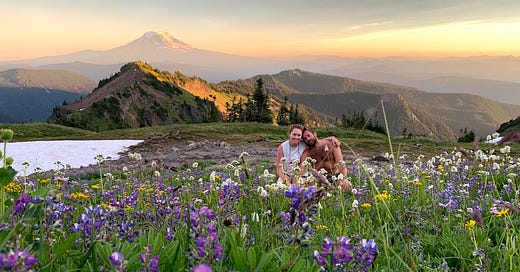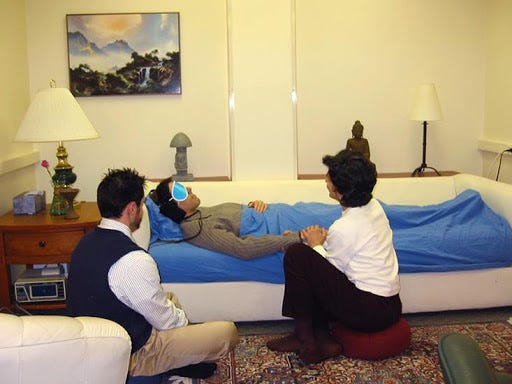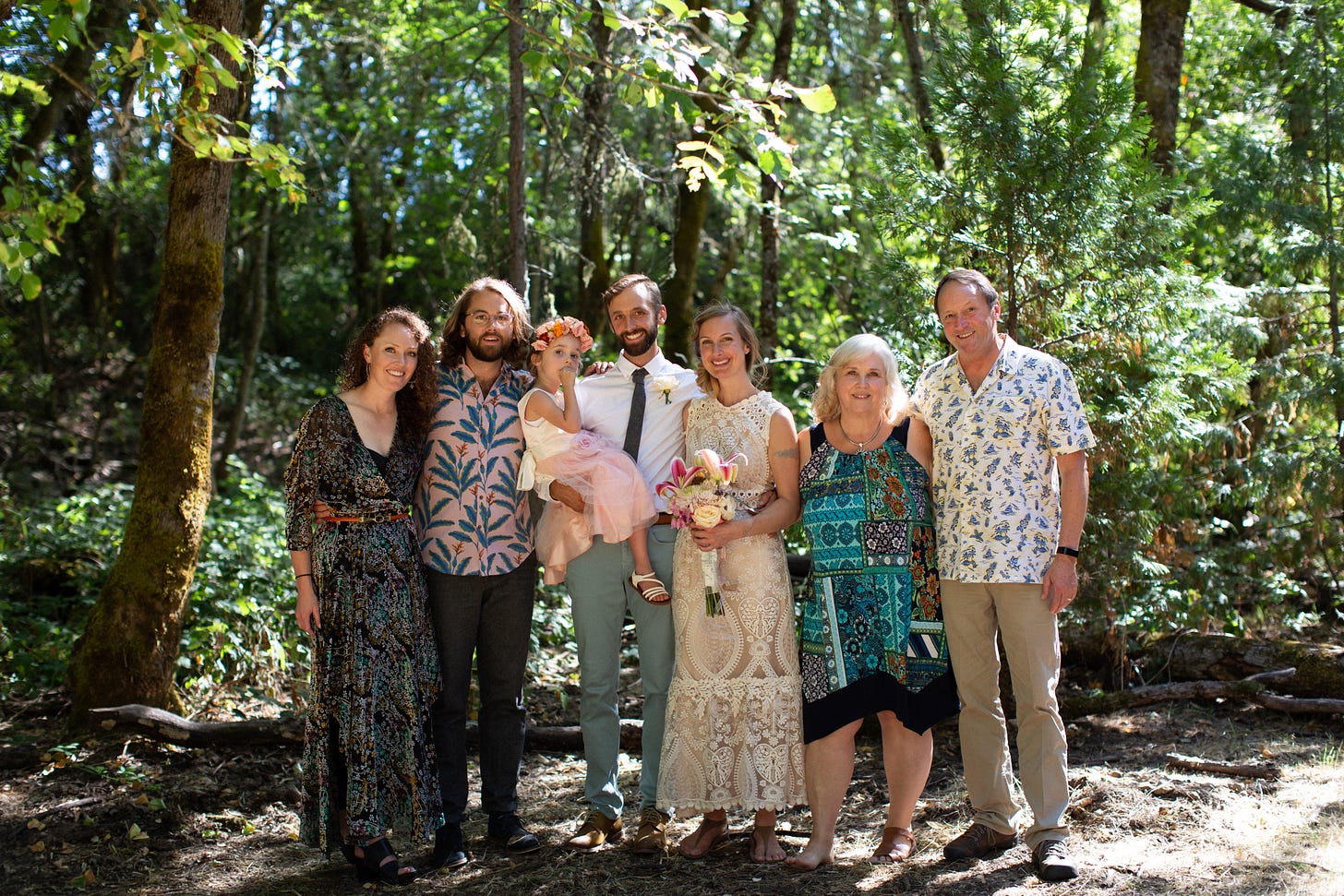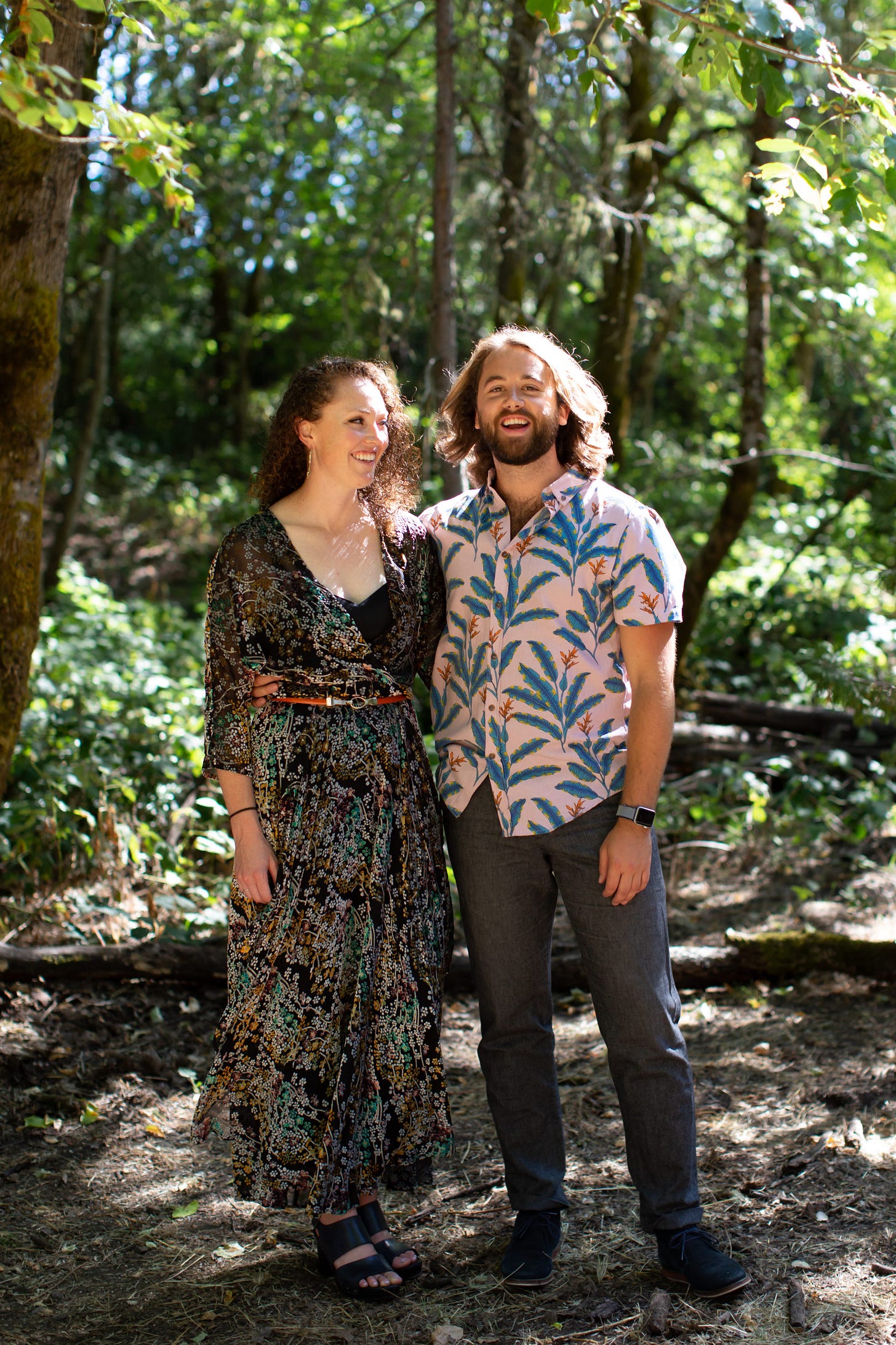Nathan Howard: Mental health and mushrooms
How "defragmenting" your mind can lead to all sorts of positive outcomes.
Nathan Howard is the Cofounder & President at East Fork Cultivars as well as an advisor to several political campaigns and candidates. He serves on the Board of Directors at a handful of Oregon-based organizations.
EDITOR’S NOTE: Oregonians will have a chance to vote "yes" on Measure 109 this November and authorize the Oregon Health Authority (OHA) to create a program to permit licensed service providers to administer psilocybin-producing mushroom and fungi products to individuals 21 years of age or older.
A counterintuitive key to superb mental health: psilocybin mushrooms
Nathan and his partner, Leslie.
It was approaching 6pm as I laid back on our living room couch. It's the most comfortable place in our small, 99-year-old home just off Laurelhurst Park. A James Brown mix I had put on Spotify was playing at a mellow volume. The February evening chill was making its presence known through our big single pane window above the couch.
I wondered if I should consume more.
I couldn't tell whether or not I had eaten an adequate amount of psilocybin-producing mushrooms. An adequate amount meaning enough to take my brain’s Default Mode Network (DMN) offline, or partially offline. That was my goal, after all.
In neuroscience, the DNM is a large-scale brain network primarily composed of the prefrontal cortex. As explained by researcher and writer Jasmine Virdi, the Default Mode Network is an interconnected group of brain regions that are associated with introspective functions, internally directed thought - such as self-reflection, and self-criticism.
In other words, the DMN creates and maintains a human's sense of self, our egos.
Egos are wonderful things. They help us survive and operate. Our egos often keep us alive and moving forward during challenging moments. But they can also be the source of serious suffering.
This suffering can be hard to address. Egos often operate in the deep subconscious, which means that when they are the source of suffering (e.g. depression from unresolved trauma, addiction, anxiety, obsessive compulsive disorder, etc.) it can be nearly impossible to resolve that suffering. But it’s not impossible.
MRI scans show that people who consume a therapeutic dose (that is a rather large dose) of psilocybin mushrooms have significantly reduced activity in the DMN region of their brain. This is well documented and explained in a landmark 2017 study: Psilocybin for treatment-resistant depression: fMRI-measured brain mechanisms.
Ok, mushrooms can impact brain activity. So what?
Brain scans taken before and after ingesting psilocybin. Provided by Nathan.
Magic mushrooms, ego, James Brown, prefrontal cortex, and the Default Mode Network. Okay where are we going with all this?
Here's where it all comes together in a counterintuitive fashion.
Psychiatric doctor and researcher Simon Ruffell likens the effects on the DMN of psychedelics, such as the compound psilocybin which is produced in certain mushrooms, to “defragmenting a computer.”
When you ingest a psychedelic, activity of the DMN is significantly decreased whilst connectivity in the rest of the brain increases. According to Ruffell:
Brain imaging studies suggest that when psychedelics are absorbed they decrease activity in the default mode network. As a result the sense of self appears to temporarily shut down, and thus ruminations may decrease. The brain states observed show similarities to deep meditative states, in which increased activity occurs in pathways that do not normally communicate. This process has been compared to defragmenting a computer. Following this, it appears that the default mode network becomes more cohesive. We think this could be one of the reasons levels of anxiety and depression appear to reduce.
It turned out I took enough
An example of a deliberate set and setting experience. Provided by Nathan.
That February evening last year remains one of the most important experiences of my life.
Since then, I've connected with my family more. I've enjoyed my work more. My relationship with alcohol is much healthier. My partner and I are better than we’ve ever been; she watched over me that evening as I experienced what some refer to as ego death and while a partial and very temporary paralysis took over, a common side effect of consuming large amounts of psilocybin.
Of course, these benefits aren’t guaranteed nor effortless. For example, the next day my partner and I resolved to begin couples therapy to work on the last remaining incompatibilities that caused tension in our relationship after having worked through most of our incompatibilities over five and a half years. Therapy has been difficult but rewarding. We recently celebrated our 7-year anniversary and we've never been happier together.
These are some of the outcomes of my carefully-planned, single session with a large and intentional dose of psilocybin, taken under a specific set and setting.
My experience was not unique
Nathan and his family.
A renaissance of research and cultural acceptance of this special molecule, and of psychedelics more broadly, has been building slowly over the past several decades.
Perhaps no research catalyzed this renaissance more than the watershed study entitled “Mystical-type experiences occasioned by psilocybin mediate the attribution of personal meaning and spiritual significance 14 months later,” published on July 1st, 2008. It was this study that led to Michael Pollan's popular 2018 book, How to Change Your Mind How to Change Your Mind: What the New Science of Psychedelics Teaches Us About Consciousness, Dying, Addiction, Depression, and Transcendence.
Have you read the abstract of a dense scientific research paper before? Have you seen someone end a personal story with an abstract of a dense scientific research paper? Abstract of the 2008 study mentioned above:
Psilocybin has been used for centuries for religious purposes; however little is known scientifically about its long-term effects.
We previously reported the effects of a double-blind study evaluating the psychological effects of a high psilocybin dose. This report presents the 14-month follow-up and examines the relationship of the follow-up results to data obtained at screening and on drug session days. Participants were 36 hallucinogen-naïve adults reporting regular participation in religious/spiritual activities. Oral psilocybin (30 mg/70kg) was administered on one of two or three sessions, with methylphenidate (40 mg/70kg) administered on the other session(s).
During sessions, volunteers were encouraged to close their eyes and direct their attention inward. At the 14-month follow-up, 58% and 67%, respectively, of volunteers rated the psilocybin-occasioned experience as being among the five most personally meaningful and among the five most spiritually significant experiences of their lives; 64% indicated the experience increased well-being or life satisfaction; 58% met criteria for having had a “complete” mystical experience.
Correlation and regression analyses indicated a central role of the mystical experience assessed on the session day in the high ratings of personal meaning and spiritual significance at follow-up. Of the measures of personality, affect, quality of life, and spirituality assessed across the study, only a scale measuring mystical experience showed a difference from screening.
When administered under supportive conditions, psilocybin occasioned experiences similar to spontaneously-occurring mystical experiences that, at 14-month follow-up, were considered by volunteers to be among the most personally meaningful and spiritually significant of their lives."
Nathan and his partner, Leslie.
This November, Oregonians will vote on Measure 109 which would establish a well regulated psilocybin therapy system in Oregon managed by the Oregon Health Authority.
With this measure, along with Measure 110, the Beaver State is on the precipice of landmark and world-leading changes in the way we approach criminal justice and drug policies. The outcome of these two measures will determine whether or not Oregon will be on the very forefront of these issues not just in the United States, but worldwide.
*************************************
Keep the conversation going on our Facebook page (www.facebook.com/oregonway) or via Twitter (@the_oregon_way).
You can send your thoughts to Nathan via Twitter @NathanHowardPDX








